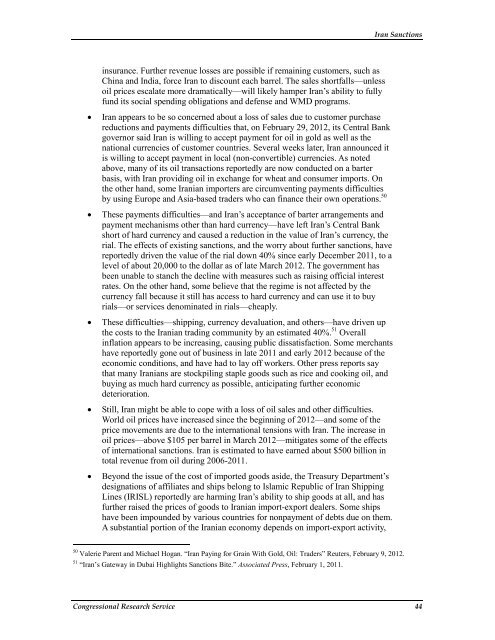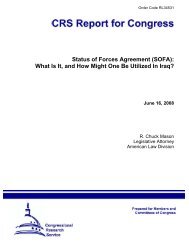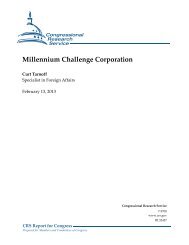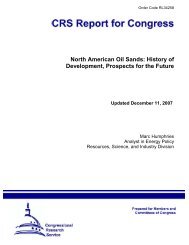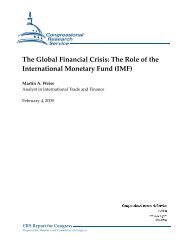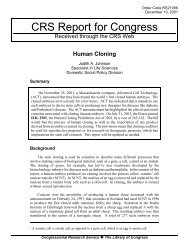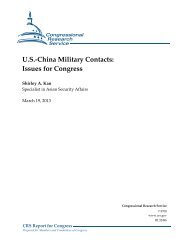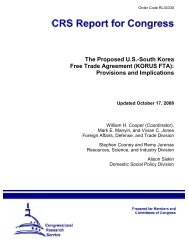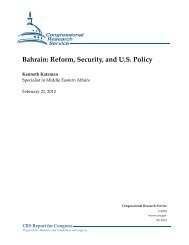Iran Sanctions - Foreign Press Centers
Iran Sanctions - Foreign Press Centers
Iran Sanctions - Foreign Press Centers
Create successful ePaper yourself
Turn your PDF publications into a flip-book with our unique Google optimized e-Paper software.
insurance. Further revenue losses are possible if remaining customers, such as<br />
China and India, force <strong>Iran</strong> to discount each barrel. The sales shortfalls—unless<br />
oil prices escalate more dramatically—will likely hamper <strong>Iran</strong>’s ability to fully<br />
fund its social spending obligations and defense and WMD programs.<br />
• <strong>Iran</strong> appears to be so concerned about a loss of sales due to customer purchase<br />
reductions and payments difficulties that, on February 29, 2012, its Central Bank<br />
governor said <strong>Iran</strong> is willing to accept payment for oil in gold as well as the<br />
national currencies of customer countries. Several weeks later, <strong>Iran</strong> announced it<br />
is willing to accept payment in local (non-convertible) currencies. As noted<br />
above, many of its oil transactions reportedly are now conducted on a barter<br />
basis, with <strong>Iran</strong> providing oil in exchange for wheat and consumer imports. On<br />
the other hand, some <strong>Iran</strong>ian importers are circumventing payments difficulties<br />
by using Europe and Asia-based traders who can finance their own operations. 50<br />
• These payments difficulties—and <strong>Iran</strong>’s acceptance of barter arrangements and<br />
payment mechanisms other than hard currency—have left <strong>Iran</strong>’s Central Bank<br />
short of hard currency and caused a reduction in the value of <strong>Iran</strong>’s currency, the<br />
rial. The effects of existing sanctions, and the worry about further sanctions, have<br />
reportedly driven the value of the rial down 40% since early December 2011, to a<br />
level of about 20,000 to the dollar as of late March 2012. The government has<br />
been unable to stanch the decline with measures such as raising official interest<br />
rates. On the other hand, some believe that the regime is not affected by the<br />
currency fall because it still has access to hard currency and can use it to buy<br />
rials—or services denominated in rials—cheaply.<br />
• These difficulties—shipping, currency devaluation, and others—have driven up<br />
the costs to the <strong>Iran</strong>ian trading community by an estimated 40%. 51 Overall<br />
inflation appears to be increasing, causing public dissatisfaction. Some merchants<br />
have reportedly gone out of business in late 2011 and early 2012 because of the<br />
economic conditions, and have had to lay off workers. Other press reports say<br />
that many <strong>Iran</strong>ians are stockpiling staple goods such as rice and cooking oil, and<br />
buying as much hard currency as possible, anticipating further economic<br />
deterioration.<br />
• Still, <strong>Iran</strong> might be able to cope with a loss of oil sales and other difficulties.<br />
World oil prices have increased since the beginning of 2012—and some of the<br />
price movements are due to the international tensions with <strong>Iran</strong>. The increase in<br />
oil prices—above $105 per barrel in March 2012—mitigates some of the effects<br />
of international sanctions. <strong>Iran</strong> is estimated to have earned about $500 billion in<br />
total revenue from oil during 2006-2011.<br />
• Beyond the issue of the cost of imported goods aside, the Treasury Department’s<br />
designations of affiliates and ships belong to Islamic Republic of <strong>Iran</strong> Shipping<br />
Lines (IRISL) reportedly are harming <strong>Iran</strong>’s ability to ship goods at all, and has<br />
further raised the prices of goods to <strong>Iran</strong>ian import-export dealers. Some ships<br />
have been impounded by various countries for nonpayment of debts due on them.<br />
A substantial portion of the <strong>Iran</strong>ian economy depends on import-export activity,<br />
<strong>Iran</strong> <strong>Sanctions</strong><br />
50<br />
Valerie Parent and Michael Hogan. “<strong>Iran</strong> Paying for Grain With Gold, Oil: Traders” Reuters, February 9, 2012.<br />
51<br />
“<strong>Iran</strong>’s Gateway in Dubai Highlights <strong>Sanctions</strong> Bite.” Associated <strong>Press</strong>, February 1, 2011.<br />
Congressional Research Service 44


